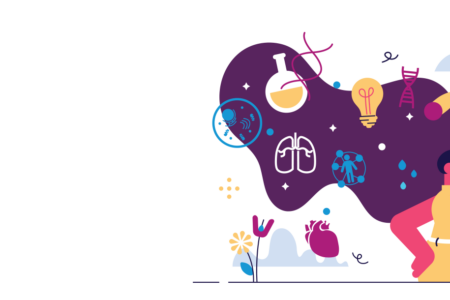Gemma Scanlon, NHS Greater Glasgow and Clyde, UK and Nikita Patel, Queen Mary University of London, UK
A degree in physiology or related subject can lead to a multitude of careers in different fields. For National Career’s Week, we consider a couple of the paths you can venture on.
In this blog, we share first-hand accounts from graduates in the world of research and healthcare who presented at this week’s Physiology Careers Showcase, our online career’s workshop.
A career in healthcare
A degree in physiology enables you to work in a range of healthcare roles. Gemma Scanlon, NHS Greater Glasgow and Clyde, UK, is a physiology graduate who trained to become a respiratory physiologist. She shares her career journey and the training she took to work in paediatrics.

I graduated from the University of Glasgow, UK, in 2013 with a BSc Hons in Physiology. I wasn’t sure what career I wanted to pursue, or even what options were available to me. All I knew was that I wanted to work with patients in a healthcare setting.
A quick search on the NHS Job Site led me to an Assistant Respiratory Physiologist post, which is an entry level position that didn’t require any previous experience.
After only three months in this job, I applied and was accepted to do the Scientist Training Programme (STP). This is a three-year programme of work-based learning, supported by a university master’s accredited degree.
The STP opened up a range of fantastic opportunities, including rotational work-based placements in other physiology departments, and an elective placement that I chose to do in the Respiratory Physiology Department at the Children’s Hospital in Glasgow, UK.
I absolutely loved working with the children and their families during my four-week placement. I knew then that I wanted to pursue a job in paediatrics. I worked with adults for two more years before moving into my current role as a Respiratory and Sleep Physiologist at the Royal Hospital for Children in Glasgow.
I work directly with patients, performing a variety of routine and complex diagnostic tests to assess various aspects of lung function and sleep breathing. I have held this post for the past 3 years and still enjoy the rewarding nature of the job and the challenges that each day brings.
A career in research
Nikita Patel is in her final year of her PhD at The William Harvey Research Institute, Queen Mary University of London, UK, having chosen to pursue further study in physiology. She shares her academic route into therapeutics research.

About ten years ago, I had what I would call my ‘lightbulb moment’. It was when I first learnt about the field of pharmacology. I was on a Nuffield Science Research Placement at Kingston University, London, UK with Dr Nicholas Freestone, Associate Professor and Education and Teaching Theme Lead at The Society. This inspired me to pursue a career in research.
I went onto complete an integrated Master’s (MSci) in Pharmacology at University College London, UK. I undertook a literature project entitled ‘Asthma: when breathing is easier said than done’ and investigated ‘The impact of ageing on neutrophil chemotaxis’ for my final laboratory project with Professor Derek Gilroy at the Centre of Clinical Pharmacology and Therapeutics.
In 2018, I embarked on my PhD moving to The William Harvey Research Institute, Queen Mary University of London, UK, to work with Professor Christoph Thiemermann at the Centre of Translational Medicine and Therapeutics.
This led to my current research on ‘New Therapeutic Approaches for Trauma-Associated Haemorrhagic Shock’. I am focused on the multiple organ dysfunction that can ensue following a traumatic injury, such as road traffic accident, stabbing or shooting.
I was drawn to this subject due to the shocking statistics that someone dies of trauma every six seconds and there are more deaths caused by trauma than HIV, tuberculosis and malaria combined. Despite this, there are still no treatments for multiple organ failure. Hopefully, with more research and my own contributions to targeting this syndrome will help get us one step closer to finding a treatment and save lives.
You can find more inspiration and information on careers in physiology here and the ways The Society can support you.

